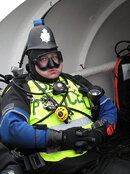Government regulation of dive activities is something I would stand behind. If private individuals, organizations, or businesses wouldn't, or couldn't, enforce rules and regulations, then the government should step in. I am well aware that the right thing to do almost never get done until the government steps in. For example, school segregation is wrong, but still, it took a ruling called Brown vs. Board of Education to end it.
I totally understand that there is a financial incentives for dive charters and dive masters to look the other way if the violations are minor (ex: touching wildlife, touching corals). If they look the other way, they would keep the customer happy, because letting the customers do whatever they want is good customer service (sarcasm). I am embarrassed to admit this, but this is based on personal experience. When I was diving with my extended family in Malaysia back in 2006, my uncle loudly admit that he touched coral and wildlife and my divemaster literally covered his eyes with his hand when he sees my uncle doing it...
Currently, I have this idea. I was reading the "How to piss off a divemaster?" thread and I am shocked by the abuses a divemaster receives. What if from now on, a divemaster will also have the responsibility to report safety violations or fisheries and habitat protection violation (ex: illegally harvesting sea cucumbers for BBQ). Thankfully, all divers on-board a charter would have signed a waiver, which included their contact information, address, and date of birth. A divemaster could simply make a photocopy of the waiver and attach a copy of the incident report and forward it to the appropriate government agency (I am still deciding on what government agency should be responsible for this). A couple days later (depending on the efficiency of the agency), the person suspected of breaking the rules will receive a call from said agency and be given a chance to defend himself. If it is determined that said individual is guilty, his licence will be taken away and he will be stopped from diving for a certain amount of time, or if the violation is very, very serious, banned for life. Due to the concept of judicial independence, the suspect can certainly fight the ruling in court.
This system, if implemented, will let divers know that what they did underwater will have consequences. The dive master may not be able to stop you now, but you will have to deal with the US government once you return home.
This system is not extreme at all and there are already precedence for this. For example, driving. If you sped while driving, you get points taken from you and your licence will be taken from you after a certain amount of point. You drink and drive and was caught, you have your licence taken away and you may go to jail. There is also a precedence for this in diving as well. If you look at PADI's QM department's QM Procedure Flow Chart, my system is inspired by it. The difference is that whereas PADI QM deals with Divemasters and above, my system deals with everyone who dive.
Unfortunately, this system will not work if the task of regulating and enforcing is given to a dive training organization (ex: PADI). The reason is that the relationship between training organization and us is still a service provider/ customer relationship and hence unequal. A diver can simply laugh at the training organization in the face and go to another organization. Now, if it is the government coming after them though, they won't be laughing.
I remember back in university, my American history professor once said, "Self-Regulation is always better than government regulation. Government regulation is almost always a lot harsher than self-regulation." Of course it would be best if training organization can also regulate and enforce rules, but as I mentioned above, the unequal service provider/ customer position makes regulating and enforcing hard.






